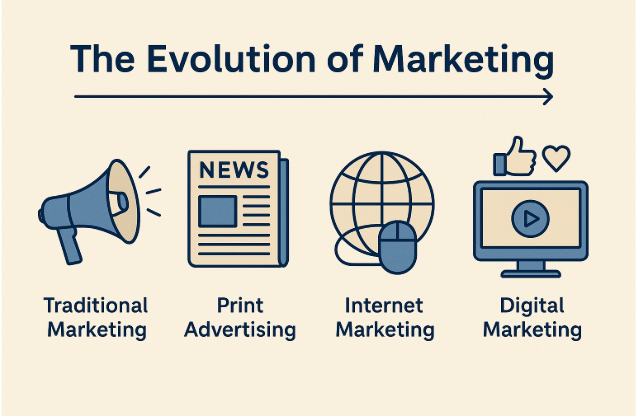
Marketing has undergone a remarkable transformation over the years, evolving from simple word-of-mouth strategies to sophisticated digital campaigns that reach a global audience. Understanding this evolution helps businesses adapt and thrive in a fast-changing market. Let’s take a journey through the key stages of marketing evolution and explore its current digital era.
1. Traditional Marketing: The Foundation
Before the digital revolution, marketing relied on traditional methods like print media, radio, television, and billboards. Businesses reached their audiences through:
- Newspapers & Magazines – Print ads were the go-to marketing tool.
- Radio & Television – Commercials brought brands into people’s homes.
- Billboards & Posters – Eye-catching visuals attracted local consumers.
- Word-of-Mouth – A powerful tool, even in today’s digital world.
These methods were highly effective but had limitations in tracking performance and audience engagement.
2. The Rise of Digital Marketing
The internet revolutionized marketing, making it more interactive, measurable, and cost-effective. Businesses shifted to digital platforms, utilizing:
- Websites & SEO – A strong online presence became essential.
- Email Marketing – Direct communication with customers.
- Social Media Marketing – Platforms like Facebook, Instagram, and LinkedIn provided new ways to engage audiences.
- Content Marketing – Blogs, videos, and infographics educated and entertained consumers.
Digital marketing made it easier to track ROI, segment audiences, and personalize campaigns, leading to better engagement and higher conversions.
3. The Social Media Boom
The past decade has seen an explosion in social media usage, changing how brands interact with their audiences. Key trends include:
- Influencer Marketing – Collaborating with influencers to build trust.
- Video Content – Short-form videos on TikTok, Instagram Reels, and YouTube dominate.
- Real-Time Engagement – Brands now respond instantly to customer queries and trends.
Social media has made marketing more dynamic and allows businesses to humanize their brand by directly interacting with their customers.
4. The AI & Data-Driven Marketing Era
Today, Artificial Intelligence (AI) and big data play a huge role in marketing strategies. Businesses use:
- Chatbots & AI Assistants – For instant customer support.
- Personalization – Tailored content based on user behavior.
- Predictive Analytics – Forecasting consumer trends for proactive marketing.
Data-driven marketing allows businesses to make smarter decisions and create hyper-personalized experiences for their audiences.
The Future of Marketing
Marketing will continue to evolve, incorporating more automation, virtual reality (VR), and immersive experiences. Brands will need to stay ahead of trends to remain competitive in an increasingly digital world.
As a digital marketing expert in Edappal, Malappuram, I help businesses navigate this ever-changing landscape by implementing modern strategies that drive growth. Whether you’re a startup or an established brand, embracing digital marketing is key to staying relevant and competitive.
Are you ready to take your marketing to the next lev
